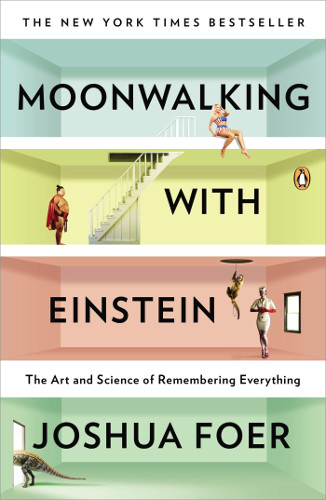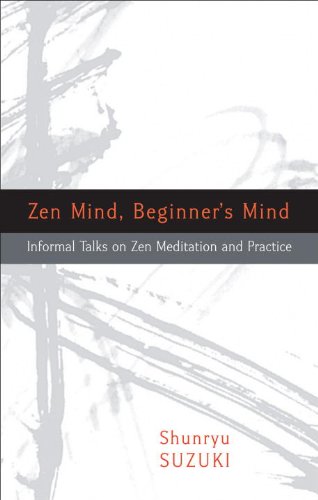This week I read Moonwalking with Einstein by Joshua Foer, the story of how he went from a regular journalist, to U.S. Memory Champion in one year. Because who wouldn’t like to be able to remember more? In addition to the story of his journey to being champion, he also describes the methods which he used to train his memory to be able to recall things such as the order of a shuffled deck of playing cards or a string of random digits.
The book opens with a concise summary of the problems most of us face with our memories on a daily basis, which Foer put as:
Every day there seems to be more to remember: more names, more passwords, more appointments. With a memory like Ben Pridmore’s, I imagined, life would be quantitatively different–and better. Our culture constantly inundates us with new information, and yet our brains capture so little of it. Most just goes in one ear and out the other. If the point of reading were simply to retain knowledge, it would probably be the single least efficient activity I engage in. I can spend a half dozen hours reading a book and then have only a foggy notion of what it was about. All those facts and anecdotes, even the stuff interesting enough to be worth underlining, have a habit of briefly making an impression on me and then disappearing into who knows where. There are books on my shelf that I can’t even remember whether I’ve read or not.
If it weren’t for the notes I’d underlined and copied down, I’d never be able to remember what I found interesting in a book, even just a few weeks after having read it. We spend so much time reading a book, knowing all along that we will soon forget most of what we have read, it can become quite frustrating at times, having such a constrained and limited memory.
Of course the main reason for reading the book was to find out how he’d managed to improve his memory so much. It ultimately comes down to being able to convert information into images, which can then be stored in a “memory palace.” The human brain is much better at remembering spaces and images than text or numbers, so by converting them into images, we can make them much easier to remember.
One quote that really struck me was in regards to the importance of memory to learning, beyond just the ability to recall facts. Foer said:
The more tightly any new piece of information can be embedded into the web of information we already know, the more likely it is to be remembered. People who have more associations to hang their memories on are more likely to remember new things, which in turn means they will know more, and be able to learn more. The more we remember, the better we are at processing the world. And the better we are at processing the world, the more we can remember about it.
When we first starting learning about a new subject it can be difficult, as there is so much that we don’t know, it can quickly become confusing. After time though, as we get past the beginning and work through the basics, things will tend to become easier as we make more connections between what we already know and what we are learning. The trick then, is to persevere through the early difficulties, and to acquire a foundation upon which to build.
I was reminded of what Danial Kahneman had to say about memory in Thinking, Fast and Slow. First he illustrated how our memory, or at least our knowledge that our memory will likely forget what we are currently seeing or doing can affect the way in which we live our lives. Kahneman said:
The frenetic picture taking of many tourists suggests that storing memories is often an important goal, which shapes both the plans for the vacation and the experience of it. The photographer does not view the scene as a moment to be savored but as a future memory to be designed. Pictures may be useful to the remembering self–though we rarely look at them for very long, or as often as we expected, or even at all–but picture taking is not necessarily the best way for the tourist’s experiencing self to enjoy a view.
Often when we are out seeing the world or trying something new a good part of our attention is focused upon capturing and recording what we are doing and seeing, rather than focusing our full attention on actually enjoying and savoring the experience, all, at least partly, because we do not trust our memory to be able to adequately recall the moment later.
We are often so focused on how easily we forget things, that we fail to appreciate how good our memory often is and how critical it is to our ability to live our life. Kahneman reminds us of the role that memory plays in the acquisition of skills by saying:
Memory also holds the vast repertory of skills we have acquired in a lifetime of practice, which automatically produce adequate solutions to challenges as they arise, from walking around a large stone on the path to averting the incipient outburst of a customer. The acquisition of skills requires a regular environment, an adequate opportunity to practice, and rapid and unequivocal feedback about the correctness of thoughts and actions. When these conditions are fulfilled, skill eventually develops, and the intuitive judgments and choices that quickly come to mind will mostly be accurate. All this is the work of System 1, which means it occurs automatically and fast. A marker of skilled performance is the ability to deal with vast amounts of information swiftly and efficiently.
If it weren’t for memory we would not be able to acquire even the most basic skills which allow us to function as human beings. It is through practicing our skills that we find the small changes which we must make in order to improve, which our memory then allows us to recall the next time we go to use that skill and to thereby increase our performance.
While we’ll likely never be able to recall everything we would like to be able to, there is one easy way in which we can attempt to better recall our life and that which we find worth trying to remember. By making a deliberate effort to focus on what we are doing, and being mindful of it, it makes it much more likely that we will be able to remember it later, because we can’t remember that which we don’t pay attention to.


